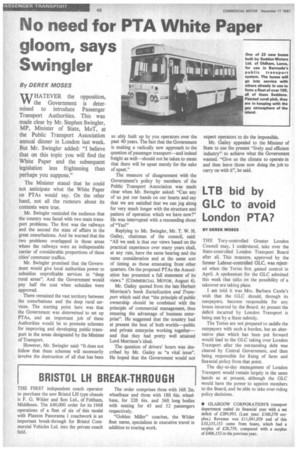No need for PTA White Paper gloom, says Swingler
Page 48

If you've noticed an error in this article please click here to report it so we can fix it.
By DEREK MOSES WHATEVER the opposition, the Government is determined to introduce Passenger Transport Authorities. This was made clear by Mr. Stephen Swingler, MP, Minister of State, MoT, at the Public Transport Association annual dinner in London last week. But Mr. Swingler added: "I believe that on this topic you will find the White Paper and the subsequent legislation less frightening than
perhaps you suppose."
The Minister stated that he could not anticipate what the White Paper on PTAs would say. On the other hand, not all the rumours about its contents were true.
Mr. Swingler reminded the audience that the country was faced with two main transport problems. The first was the railways and the second the state of affairs in the great conurbations. And he warned that the two problems overlapped in those areas where the railways were an indispensable carrier of considerable proportions of these cities' commuter traffics.
Mr. Swingler promised that the Government would give local authorities power to subsidize unprofitable services in "deep rural areas". And the Government would pay half the cost when subsidies were approved.
There remained the vast territory between the conurbations and the deep rural services. The starting point here was that the Government was determined to set up PTAs, and an important job of these Authorities would be to promote schemes for improving and developing public transport in the areas designated by the Minister of Transport.
However, Mr. Swingler said: "It does not follow that these schemes will necessarily involve the destruction of all that has been so ably built up by you operators over the past 40 years. The fact that the Government is making a radically new approach to the question of passenger transport—and indeed freight as well—should not be taken to mean that there will be upset merely for the sake of upset."
The measure of disagreement with the Government's policy by members of the Public Transport Association was made clear when Mr. Swingler asked: "Can any of us put our hands on our hearts and say that we are satisfied that we can jog along for very much longer with the structure and pattern of operation which we have now?" He was interrupted with a resounding shout of "Yes!"
Replying to Mr. Swingler, Mr. T. W. H. Galley, chairman of the council, said: "All we seek is that our views based on the practical experience over many years shall, at any rate, have the same hearing and the same consideration and at the same sort of timing as those emanating from other quarters. On the proposed PTAs the Association has presented a full statement of its views." (COMMERCIAL MOTOR, August 4).
Mr. Galley quoted from the late Herbert Morrison's book Socialization and Transport which said that "the principle of public ownership should be combined with the principle of commercial management, thus ensuring the advantage of business enterprise". He suggested that the country had at present the best of both worlds—public and private enterprise working together— and that they had pretty well attained Lord Morrison's ideal.
The question of drivers' hours was described by Mr. Gailey as "a vital issue". He hoped that the Government would not expect operators to do the impossible.
Mr. Gilley appealed to the Minister of State to use the present "lively and efficient industry" to achieve what the Government wanted. "Give us the climate to operate in and then leave those now doing the job to carry on with it", he said.
















































































































































